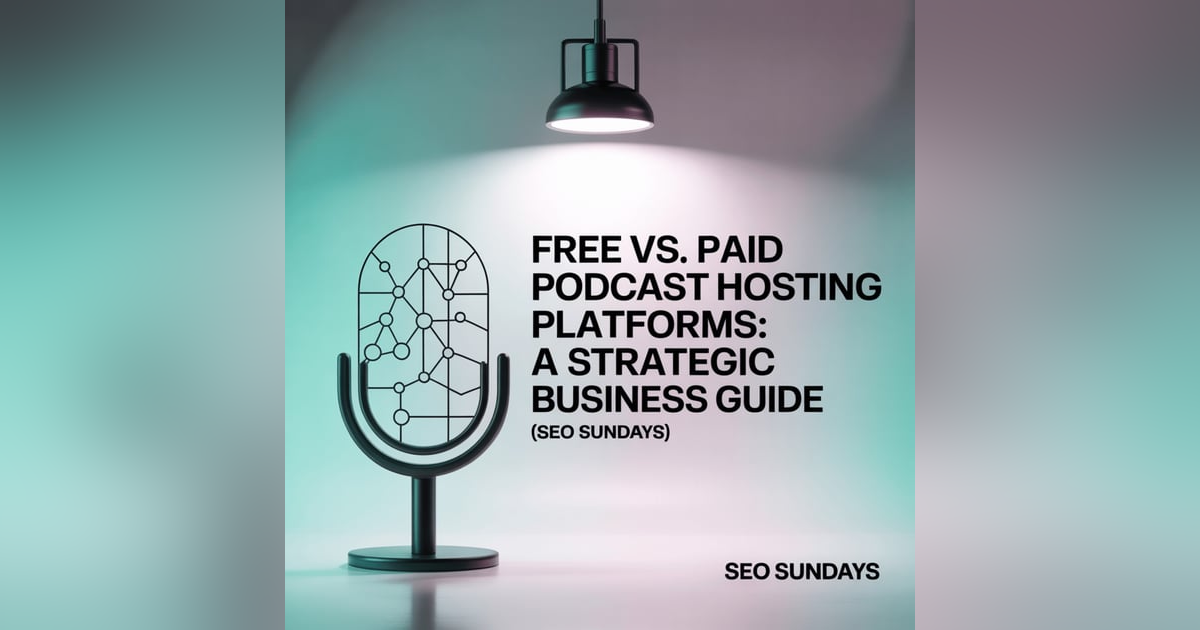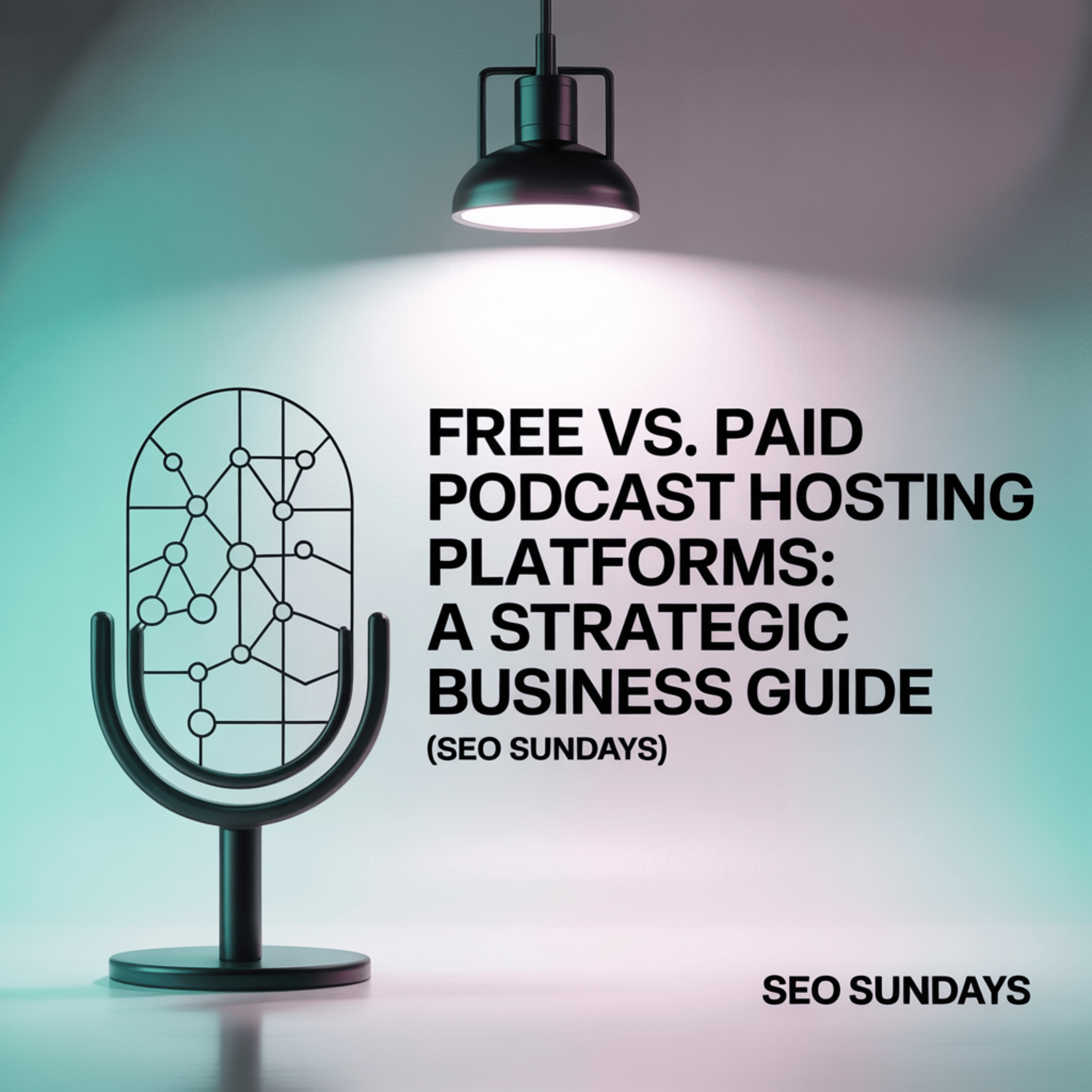Free vs. Paid Podcast Hosting Platforms: A Strategic Business Guide (SEO Sundays with Favour Obasi-ike)


Free vs. Paid Podcast Hosting Platforms - A Strategic Business Guide (SEO Sundays) with SEO Expert, Favour Obasi-ike, MBA, MS.
Looking for insights on free versus paid podcast hosting platforms? Favour Obasi-ike, with six years of experience using free platforms like Spotify for Creators (formerly Anchor.fm), explains the benefits and drawbacks of each option.
He emphasizes the importance of owning one's RSS feed and understanding analytics for monetization, detailing his recent switch to a paid platform, Art19 by Amazon, for better data and ad control.
The discussion also touches on broader business principles, including consistent content creation and community building, suggesting a strategic progression from free to paid hosting as a podcast grows.
FAQs about this episode
What is the main distinction between free and paid podcast hosting platforms?
The core difference between free and paid podcast hosting platforms lies in the level of control, data access, and monetization opportunities they offer. While free platforms like Spotify for Podcasters (formerly Anchor.fm) are excellent for starting and building an audience due to their accessibility and ease of use, they often come with limitations on analytics, character limits for descriptions, and control over advertising. Paid platforms, on the other hand, provide more comprehensive analytics, greater control over ad placements (including the ability to approve or reject brands), better distribution tools, and increased potential for monetization, allowing podcasters to scale their operations and potentially generate more income.
Why is owning your RSS feed crucial for podcasters?
Owning your RSS (Really Simple Syndication) feed is paramount because it acts as your podcast's unique identification code and intellectual property. It's akin to having the title to your car or your social security number – it signifies ownership and control. The RSS feed is what allows your podcast to be distributed across various platforms like Apple Podcasts, Amazon Music, Spotify, and more. Without direct control over your RSS feed, you might face significant challenges if you decide to switch hosting platforms, as it could be tied to an email address or account you don't fully control, hindering your ability to migrate your content and audience seamlessly.
What are the key benefits of transitioning from a free to a paid podcast hosting platform?
The transition from a free to a paid podcast hosting platform offers several significant benefits, primarily centered around enhanced control, data, and monetization. Paid platforms typically provide:
- Comprehensive Analytics: Access to detailed data about listeners, downloads, and geographical reach, allowing for better audience understanding and informed content strategy.
- Monetization Control: The ability to implement programmatic ads, host-read ads, and baked-in ads, with some platforms (like Art19) offering the unique advantage of approving or rejecting specific brands for advertising.
- Increased Visibility and Reach: While free platforms offer distribution, paid platforms can provide more robust tools for maximizing reach and ensuring content is optimized for various directories.
- Professionalism and Scaling: Moving to a paid service often signifies a commitment to professional growth and provides the infrastructure needed to scale the podcast as a business, fostering long-term sustainability and impact.
What challenges might a podcaster face when using a free hosting platform like Spotify for Podcasters (Anchor.fm)?
Despite its advantages for beginners, Spotify for Podcasters (Anchor.fm) presents several limitations when compared to paid alternatives. Favour Obasi-ike highlights:
- Limited Analytics: The dashboard may only show a fraction (e.g., 10-15%) of the actual download and listener data, making it difficult to accurately assess audience engagement and growth.
- Character Limits: Restrictions on the length of podcast descriptions (e.g., 600 characters on desktop vs. 4,000 on mobile) can hinder SEO efforts and the ability to include comprehensive keywords and information.
- Lack of Ad Control: Free platforms generally do not allow podcasters to approve or reject specific brands for programmatic ads, meaning you have less control over the type of advertisements associated with your content.
- Data Migration Issues: While not explicitly a "challenge" of the free platform itself, Favour Obasi-ike notes that when moving to a new platform, historical data often cannot be transferred, requiring a fresh start on analytics.
How can podcasters effectively monetize their content?
Podcasters can monetize their content through various advertising models:
- Programmatic Ads: These are automated advertisements inserted into the podcast episodes, often without direct control over the specific brands or content of the ads.
- Host-Read Ads: The podcaster reads the advertisement themselves, integrating it seamlessly into the episode. This typically involves a script provided by the advertiser and offers a more personal touch.
- Baked-In Ads: These are advertisements that are permanently embedded into the audio file of the podcast, meaning they will be heard by all listeners regardless of when they download or stream the episode. Paid hosting platforms can facilitate these monetization avenues, with some, like Art19, offering granular control over which brands can advertise on your show, aligning advertisements with the podcast's genre and audience.
What is Favour Obasi-ike's personal experience and recommendation regarding free vs. paid podcast hosting?
Favour Obasi-ike, having consistently podcasted for six years on a free platform (Spotify for Podcasters/Anchor.fm) before transitioning to a paid service (Art19 by Amazon), advocates for starting with a free platform. This approach allows podcasters to build a relationship with their audience, establish a community, and understand the fundamentals of content creation without initial financial commitment. His decision to switch to a paid platform after reaching 550+ episodes and streaming in 151 countries was primarily driven by the need for comprehensive analytics and greater control over monetization and brand partnerships. He recommends making the move to paid hosting when it aligns with your business goals and the need for deeper insights and control becomes apparent, emphasizing that it doesn't have to take six years like his journey.
Beyond hosting, what are other crucial elements for a successful podcast and online presence?
A successful podcast and robust online presence extend beyond just hosting platforms. Favour Obasi-ike emphasizes several critical elements:
- Consistency: Regularly publishing episodes builds audience expectation and loyalty.
- Building Community: Fostering a relationship with listeners creates engagement and a dedicated following.
- Intellectual Property Ownership: Protecting your content, branding, and RSS feed is vital for long-term control and scalability.
- Diversified Online Presence: Having a website, an email list, and a core product/service ensures that you maintain direct connection with your audience, even if social media platforms become unavailable. This creates a resilient business model independent of third-party platforms.
- Strategic Distribution: Submitting your RSS feed to all relevant podcast directories (Apple Podcasts, Amazon Music, iHeart Radio, Pandora, LinkedIn, etc.) maximizes reach and discoverability.
- SEO Optimization: Utilizing keywords, clear descriptions, and understanding how search works within podcasting platforms is essential for attracting new listeners.
How does the concept of "levels of wealth" relate to the discussion of podcasting platforms?
Favour Obasi-ike introduces "10 levels of wealth" to provide a broader context for why podcasters might consider their platform choices. The analogy suggests that just as individuals aim to progress through levels of financial wealth, businesses (including podcasts) should strategically plan their growth and impact. By understanding the capabilities and limitations of free versus paid platforms, podcasters can make informed decisions that align with their long-term goals for influence, income, and community impact. The idea is to move beyond mere survival (level 1) to a point where the podcast can generate significant value, offer greater control, and expand its reach and influence, mirroring the progression through wealth levels. The underlying message is that strategic choices in hosting platforms can contribute to the overall "wealth" and success of a podcast business.
Digital Marketing Resources:
>> SEO Optimization Blogs
Brands We Love and Support
Loving Me Beauty | Buy Vegan-based Luxury Products
Unlock your future in real estate—get certified in Ghana today!
See Privacy Policy at https://art19.com/privacy and California Privacy Notice at https://art19.com/privacy#do-not-sell-my-info.


